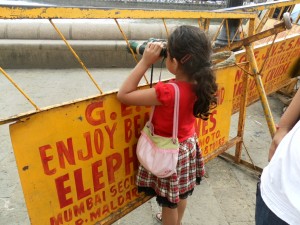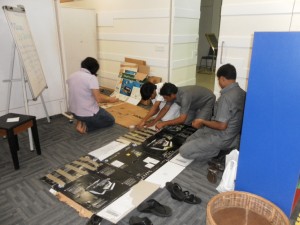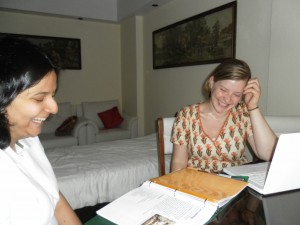 Point of view is a powerful thing.
Point of view is a powerful thing.
You come to India expecting mobs, reek, cacophony, vibrance, destitution, opulence, lawlessness, bureaucracy… and you might wind up disappointed. Hard to say. Have you gone it alone in Senegal first? Are the servants of Mumbai’s upper class attending to you presently? If so… then yes. You might find yourself remarking, as my roommate/co-teacher Emily and I did, cushioned in the leather-upholstered, air-conditioned private car driven by our employer’s chauffeur, that this is no big deal.
At the same time, it’s an enormous deal. We traveled halfway around the planet!
(And it took less than a day. From LA to Frankfurt, I chatted with an LA-based, ethnically Greek, dyed-in-the-wool New Yorker who’s promised to introduce me to a man whose family owns most of Santa Monica’s streets (?), and a mother and daughter giddily anticipating 15 days in Italy and dreaming of improvements to Toyota’s philanthropy. In Frankfurt, I walked off the turbulence, looked over foreign interpretations of American food, books, and magazines, snoozed for 30 minutes on a thoughtfully placed cot, and skedaddled. From Frankfurt to Mumbai, I was out like a light. Presto. Semi-circumnavigation.)
The time difference between LA and Mumbai? 12.5 hours. Who knew that there were halves? That’s how far away I am – the international dateline is divided up into fractions!
(And yet, you can call me at my regular phone number as if I were in LA/Glenview/Somerville right beside you – no financial difference on your end or mine. Connection’s clear as a bell.)
We spent part of the day with Monali, our boss Vasundhara’s assistant, and the other part with Malika, our Indian-based co-teacher*. We observed their subtly different cultural practices, the nuances in their account-making. We wondered how nationality shaped our views, and how class shaped theirs. We contrasted the stories and experiences of our predecessors to our own observations and activities. “Some things in Mumbai are cheap if you compare them to the States,” Malika explained. “But Mumbai is not cheap…”
The view out our living room window to the right? Luxurious residential highrises. The view out the left? A glimpse of the slum.
As we exited the bustling vegetarian restaurant where we had supped, a popular destination for upper middle-class families, Malika bestowed upon grimy beggar children the leftovers that our round-bellied, pathogen-averse bodies couldn’t handle. She was careful to give the bags to girls and to admonish the boys who sought to tear the foodstuffs from their hands. I watched the second girl, a scrappy fighter who lost the battle for the outer bag but won the war for the inner container. She scowled and held on. What is justice when all are hungry?
The driver pulled up and we slid into the backseat, reuniting with the bags of high-quality, culture- and climate-appropriate tunics we had purchased hours earlier. “No big deal,” we sighed, as Vikram sped towards the Jollymaker III, honking the whole way.
It’s not our fault that our amenities are gilded. But if we fail to challenge this, to complacently ride in our privileged bubble, then we will be at fault. We will have turned this opportunity into a restriction, fashioned a gilded cage that keeps out alternate realities and holds hostage our potential experiences and understandings.
From now on, we vowed: We’re walking.
Continue reading →
 Dedicated the day to interrogating place.
Dedicated the day to interrogating place.


